Technology made everything a thousand times better and easier — and that includes gardening. With the best plant identification apps, you no longer need to sift through gardening textbooks to know what type of plant you have. You simply need to take a snap of an unknown plant, upload it to the app, and the plant will be identified for you in real-time.
Plant identifier apps are handy not only for knowing the name of a plant but also for getting tips and reminders on how to take care of it. The latter feature makes them work like the best productivity apps, keeping you on track when it comes to your gardening goals. So, if you have a plant that you don’t know the name of or want to care for, you’ll definitely need one of the apps on this list. Here, we give you a rundown of the 20 best plant identification apps you can download on mobile.
Inside This Article
- Best Plant Identification Apps
- Planta
- LeafSnap Plant Identification
- iNaturalist
- Seek
- Garden Answers Plant Identifier
- PlantNet Plant Identification
- PictureThis Plant Identifier
- Flora Incognita
- Plantix
- Blossom
- What’s That Flower?
- FlowerChecker+
- SmartPlant
- FindPlant – Plant Identification
- Candide
- Picture Mushroom
- Shroomify
- ShroomID
- NatureID
- PlantIn
Best Plant Identification Apps
Most of the plant identification apps we included on this list are free, but some also offer paid versions if you want to unlock more features. A lot of these apps make use of AI-based photo recognition, while others rely on the expertise of botanists and horticulturists to identify plants.
Although mushrooms aren’t technically plants, we’ve included plant identification apps that recognize mushrooms here as well since we know lots of plant lovers are also into mushroom foraging. Besides, you’ll also need one just in case you see a mushroom start to grow on one of your houseplants.
1. Planta
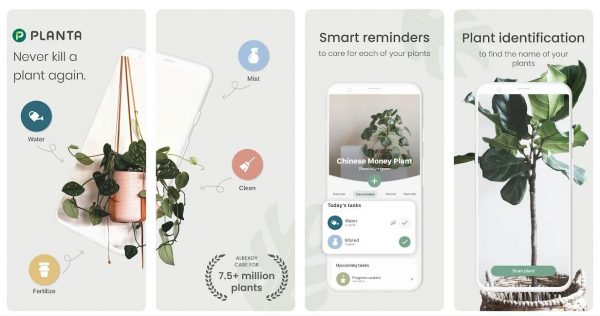
Price: Free; $7.99 for 1 Month Premium Plant Care Plan
Planta is one of the best plant identification apps for green thumbs. With the app’s plant scanner, you can simply take a photo of your plant. Planta will instantly tell you its name and how to take care of it afterward. The accuracy of the results is high.
Besides plant identification, Planta gives you smart care reminders for when it’s time to water your plant. What’s great about those reminders is that they take into consideration your location, how much light there is in the room, and other important factors. Also, those shouldn’t make you fret if you aren’t experienced in plant care yet. This plant identification app gives you step-by-step instructions on how best to keep your plants alive. Moreover, it has a light meter and a plant journal.
Getting Planta doesn’t cost you anything, but it does offer digital purchases and shows ads.
2. LeafSnap Plant Identification
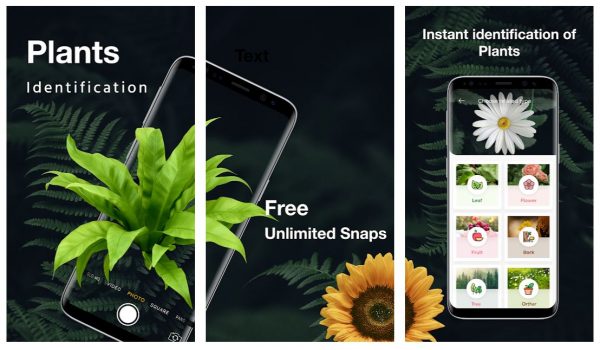
Price: Free; $25.99 for LeafSnap Premium
LeafSnap is also a great option for those who need help identifying plants. The developers created this app in collaboration with plant experts from the University of Maryland, Columbia University, and the Smithsonian Institution. As of this writing, it can accurately identify 90 percent of all known plant and tree species. So, whichever country you’re in, this is one of the plant identification apps that will surely be helpful to you. Just take a photo of the plant you want to identify and the app’s AI will tell you its name within seconds.
On top of that, Leafsnap also shows you different pictures of your plant from around the globe. That way, you can see what your plant can potentially look like (especially if it hasn’t been looking its best recently). The app also gives you a care calendar and lets you create custom collections so that you can easily keep track of your plants’ growth.
3. iNaturalist
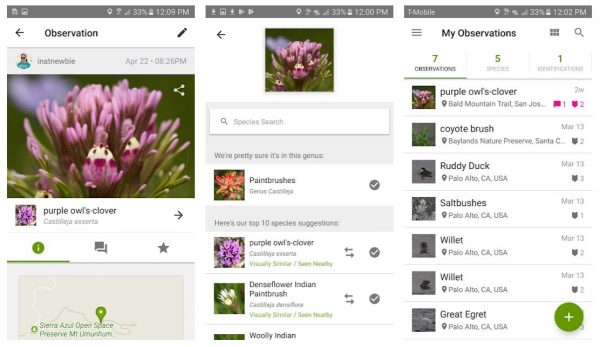
Price: Free
iNaturalist has a slightly different approach to helping you identify your plants. Whereas other plant identification apps rely on AI to tell you what plant you’ve got, this one does the job by connecting you to a community of more than 400,000 scientists, botanists, and naturalists. All you have to do is take a photo of your plant, upload it, and thousands of other iNaturalist users will help you pinpoint what it is and how to take care of it.
In the app, you can also record and share your observations about the plants you take care of. So, iNaturalist isn’t like your typical plant identifier apps. It’s also great if you want to contribute to research about plant species and nature preservation. The app is a legitimate and useful tool for aspiring plant specialists, having been developed by the National Geographic Society together with the California Academy of Sciences.
4. Seek
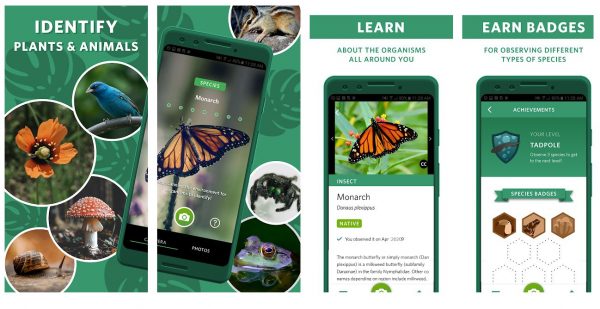
Price: Free
iNaturalist has more plant identification apps for you. The other one is Seek. The app does essentially the same thing, except that it gives you a badge every time you find a different species of plant. However, if you want to earn more badges, you’ll need to do more than just find various plant species; you’ll also need to record your observations about them.
Other than plants, Seek also helps you identify fungi, insects, birds, and all sorts of animals. Unlike iNaturalist, though, Seek helps you identify plants through AI-based image recognition, not through crowdsourcing.
What’s great about this app is that you can experience its functionalities without registering for an account.
5. Garden Answers Plant Identifier
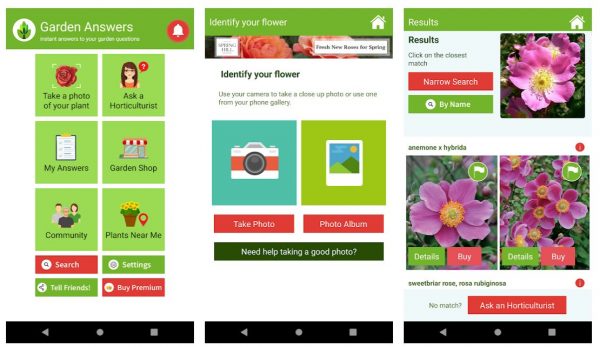
Price: Free; $3.99 for Premium
Another one of the best plant identification apps that you can try is Garden Answers. This app can help you identify more than 20,000 plant species with the help of its expertly curated database. But besides letting you know the name of the plant, Garden Answers also gives you detailed information about it. With the help of plant identification apps like this, you can identify whether a plant is harmful to humans or pets and learn about how best to handle them if they are. Plus, the app doubles as your teacher for growing your plants and caring for them.
Garden Answers helps you recognize plant diseases and pests as well so that you can deal with them as early as possible. On top of that, it also lets you easily search the database using keywords and save your favorite matches for easy access later on.
6. PlantNet Plant Identification
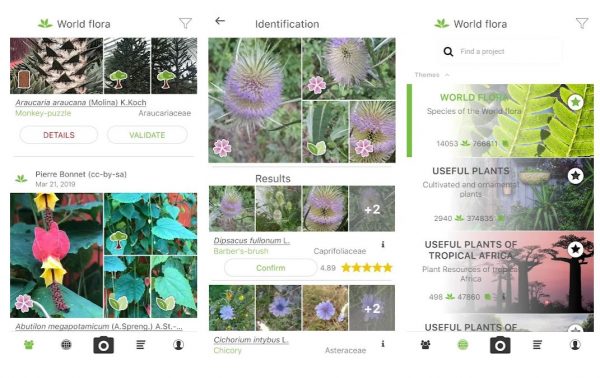
Price: Free
PlantNet is similar to iNaturalist in many ways. Like the latter, this plant identification app supports collaboration of green thumbs and plant specialists. Every time you upload plant photos to the app, you help botanists and other experts better understand plant biodiversity and preservation. However, unlike iNaturalist, the app helps you identify plants through its extensive database and not through crowdsourcing.
PlantNet has more than 20,000 plant species in its database, and thanks to the contribution of its users, this number is constantly growing. The app also supports other features that make plant identification much easier. With PlantNet, you can filter plant species by genus or family and save your favorites to access information on them more quickly. Plus, it also now allows users to identify multiple cultivated plants and re-identify flora based on new observations.
7. PictureThis Plant Identifier
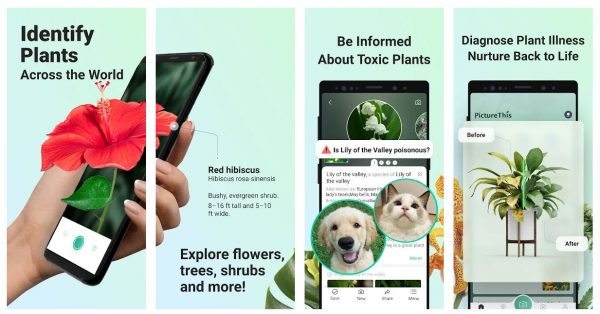
Price: Free; $29.99 for PictureThis Premium
PictureThis uses the same object recognition technology that most of the other plant identification apps on this list have. Just take a photo of the plant, upload it, and you’ll have a name within seconds. When the app has successfully identified the plant, it’ll also give you plant care tips and help you track the growth of your plant.
PictureThis isn’t just one of the best plant identification apps out there; you can also use it as a plant encyclopedia. It has readily available information on everything you need to know about a certain plant, including how to take care of it and whether it’s toxic to pets and/or humans. Plus, what’s great about the feature is that you don’t need to wait to spot a plant before you can read about its properties. Simply use the search function to look for the plant you’re interested in, and you’ll have your answers instantly.
8. Flora Incognita
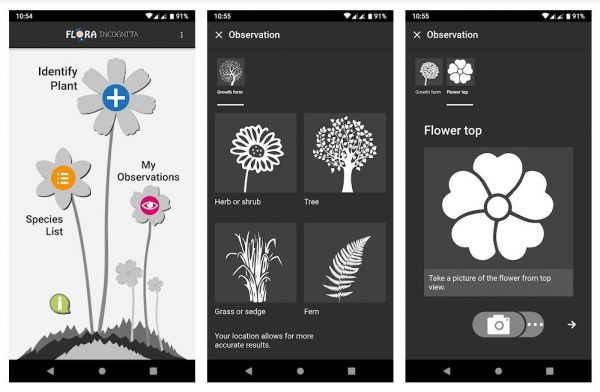
Price: Free
If you want the best plant identification apps, then you should also check out Flora Incognita. Its identification process is simple and intuitive; simply take a photo of the flower and the leaf of an unknown plant and the app will identify it for you automatically. However, note that as of this writing, Flora Incognita can only help you identify wild plants and not common indoor or garden plants.
Once the app has identified the plant, it’ll also give you a full profile of the plant species. The profile includes information such as the plants’ notable characteristics, toxicity, cultivation, and conservation status. The app also lets you share, save, and export your observations of the plant for other Flora Incognita users.
The app’s database isn’t as extensive as that of the other plant identification apps on this list. Currently, the app can only automatically identify more than 4,800 plant species.
9. Plantix
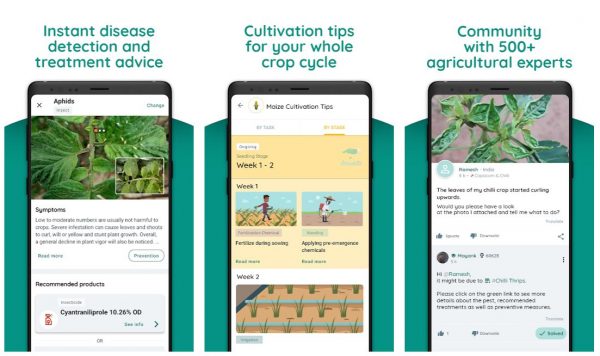
Price: Free
Plantix is the best plant identification app for those who take care of crops and herbs. The app can help you identify a plant easily. That is thanks to the help of its massive community of farmers and information database on 30 crops and over 400 species. But other than that, Plantix really comes in handy when your crops aren’t at their healthiest. Just take a good, clear photo of your infected plant and the app will help you identify what the problem is in just a few seconds. It can also give you alerts, so you’re always in the know when a crop disease has stricken your area.
Other than that, this app advises you on the best agricultural process so that your plants can grow healthily throughout the entire crop cycle. Plantix even provides you with agricultural weather forecasts and a fertilizer calculator, unlike other plant identification apps.
10. Blossom
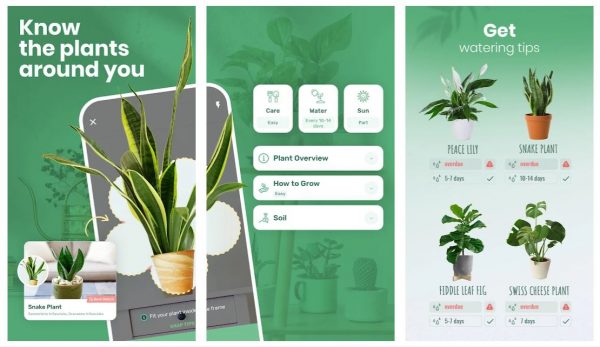
Price: Free; Blossom Premium starts at $3.99
Also one of the best plant identification apps you can try is Blossom. This app got the basics covered — it can help you identify all sorts of plants, flowers, succulents, and trees just by taking a photo. Once the app has successfully identified your plant, it will also give you tips on how to water, fertilize, and repot it. Blossom’s database contains more than 10,000 plant species and gives you information on each plant’s characteristics, including when and where they usually grow.
Apart from that, this plant identification app notifies you when it’s time to water, mist, fertilize, repot, or clean your plant. Plus, the app supports customized notifications as well. However, you’ll need to subscribe to the premium version if you want to set an unlimited number of reminders or alerts for each of your plants. Upgrading to the premium version also gives you access to unlimited identification and a light meter.
11. What’s That Flower?
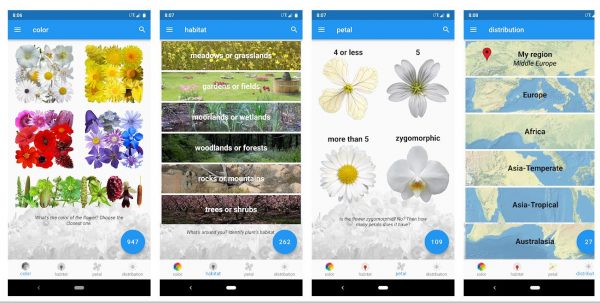
Price: Free; additional features start at $0.99
What’s That Flower? is ideal for — you’ve guessed it — identifying flowers. However, this best plant identification app doesn’t rely on photo recognition. Instead, it asks you to choose among a list of characteristics, and the app will give you the most likely matches afterward. You’ll need to provide information such as what the flower’s color is, where you found it, the number of petals, and so on. From there, the app will narrow down the results, and you can choose the one that best matches what you see. This plant identification app can help you identify over 600 flower species.
What’s That Flower? is free to download and use, but if you want access to more features, you can upgrade to the paid version. By upgrading, you get to remove ads, unlock the app’s search by photo feature, record your observations, customize filters, and use the app in offline mode.
12. FlowerChecker+
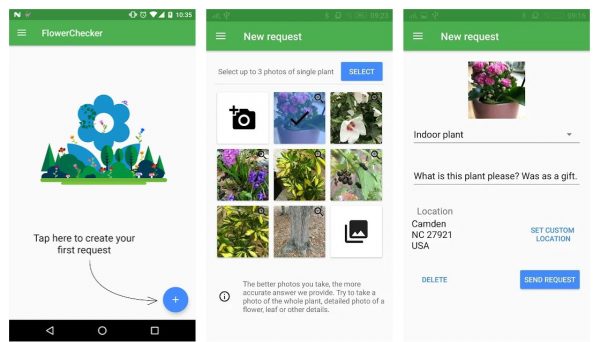
Price: $0.99
Here’s another reliable plant identification app that specializes in identifying flowers, FlowerChecker+. The app’s plant identification process does involve photo recognition, except it isn’t done by AI. Instead, it’s made possible through the help of botanists. With FlowerChecker+, you simply take a photo of just about any plant (including moss, fungi, and lichen), upload it, and wait for the experts to get back to you. The process does take a while, from a few minutes to several hours, but you do get accurate results. Of course, the accuracy of plant identification apps like this depends on the clarity of the photo you provide.
FlowerChecker+ is a paid app. However, the pricing process is a bit different from most plant identification apps. With this app, you pay about a dollar for every correct identification — a cheap price considering you’re consulting a team of experts from all over the world. That said, you won’t have to pay for the first three identifications.
13. SmartPlant
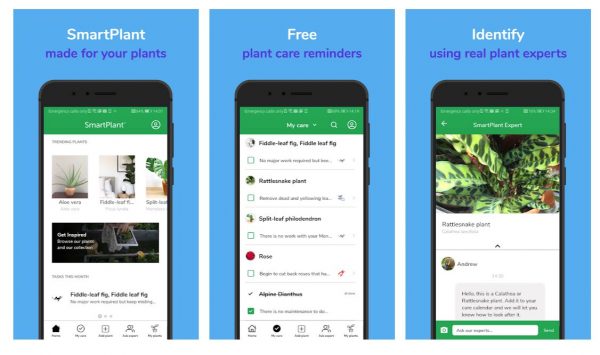
Price: Free; $0.99 per month for Premium after free trial
SmartPlant is one of the best plant identification apps that utilize the expertise of seasoned horticulturists. This app offers two tiers: free and premium. With the free version, you only get to submit one plant per month for identification and ask the app’s team of horticulture experts one question a month. You can also only get care reminders for three plants. But other than that, you get unlimited access to the app’s plant library, get immediate care advice, and discover plants through the app’s recommendations and list of trending plants.
With the premium version, you can ask for help with identifying an unlimited number of plants. Plus, there’s no longer a limit to how many times you can consult the app’s team of experts, and you can also set care reminders for all of the plants you own.
14. FindPlant – Plant Identification
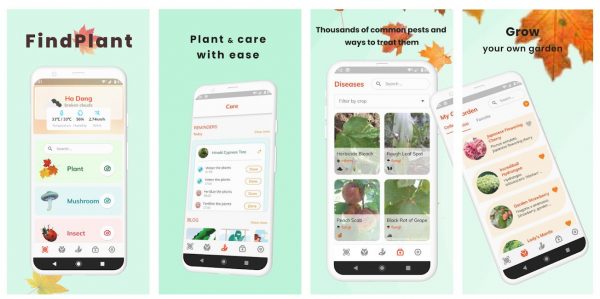
Price: Free with in-app purchases
FindPlant does more than just plant identification. Unlike other apps, it also helps you identify insects, mushrooms, and all sorts of stones and crystals. All you need to do is take a photo of what you want to identify, upload it to the app, and FindPlant will give you the best match from its database. When the app has found a match for your photo, it’ll also provide you with other useful information about that object, including care tips and where they usually grow or are found.
The app’s database is more extensive than that of the other plant identification apps on this list. It contains more than a million plant species. That means that however obscure you think the plant you’ve found is, FindPlant can probably identify it for you. The app also lets you save your favorites in the My Garden tab for easy access later on and helps you diagnose and treat plant diseases.
15. Candide
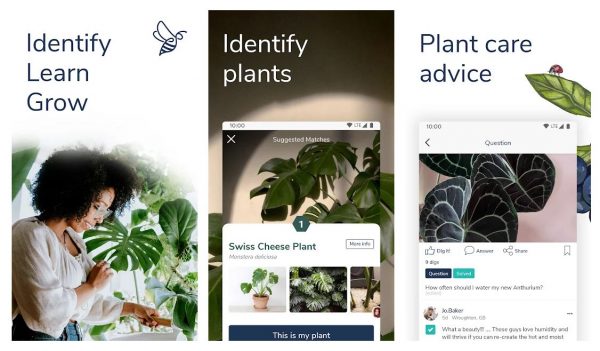
Price: Free
Candide is also a contender to be among your best plant identification apps. You only need to take a photo of a plant, upload it, and the app will tell you the name in seconds. Once Candide has identified the plant, the app will also provide tutorials to aid you in caring for it. You can also talk to the Candide community in-app about the plant you found. Through the app’s forum and community, you can also ask for (or provide) gardening tips, make friends, follow your favorite gardeners, and post photos of your plants.
Besides being a reliable plant identification tool and a thriving community of plant lovers, the app is also rich in gardening resources. In Candide, you’ll find video tutorials on various plant-related topics, as well as audio tours of the best public gardens, including ones at Babylonstoren, Cambridge University, and The Newt.
16. Picture Mushroom
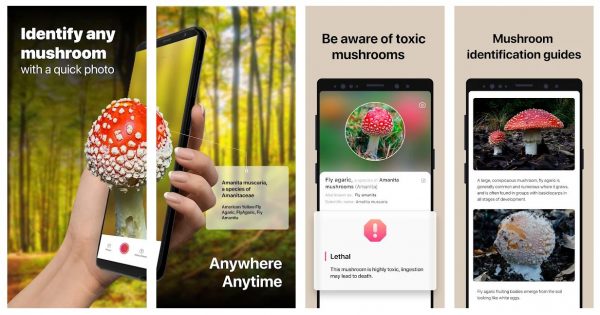
Price: Free; Up to $29.99 for Picture Mushroom Premium
Every plant lover knows that mushrooms are tricky lifeforms to deal with. While some are completely safe and edible, others can be poisonous and may even be the cause of your death. Luckily, there are plant identification apps like Picture Mushroom that help you distinguish between those two types.
With Picture Mushroom, you only have to take a photo of the mushroom that you want to identify and the app will tell you what it is instantly. Alternatively, you can simply upload a photo right from your phone’s gallery. The app also has an active and friendly community of mushroom foragers. That way, you can consult them for matters outside mushroom identification or share with them your experiences and observations. On top of that, the app has a built-in map where you can save the locations of where you found certain mushrooms. It also lets you keep track of all the mushrooms you’ve identified via its Collections feature.
17. Shroomify
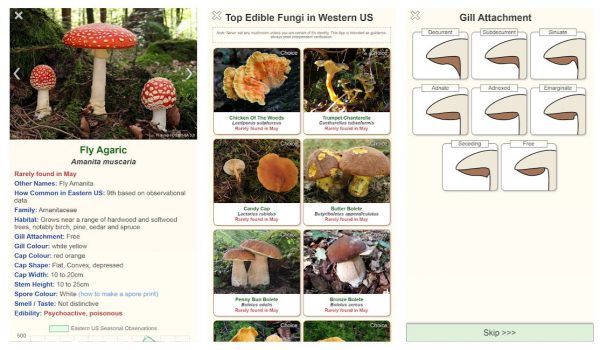
Price: Free; $3.99 for Shroomify Premium
Shroomify is another plant identification app you can download if you need help identifying mushrooms in particular. However, this app’s identification process differs from that of most plant identification apps on this list. Instead of taking a photo of the mushroom, you only need to select its characteristics within the app. Afterward, Shroomify will give you a narrowed-down list of the most likely matches along with their photos.
The app’s database contains 400 common mushroom species and provides you with more than a thousand images to help you identify each one. In this database, you’ll also find lots of useful information regarding how to harvest each mushroom, its toxicity, and so much more. So, to get more relevant results, the app uses your location to show you the mushrooms that grow in your area. The app also gives you a ranking of how common each mushroom is and tells you which part of the year you’ll see them most often.
18. ShroomID
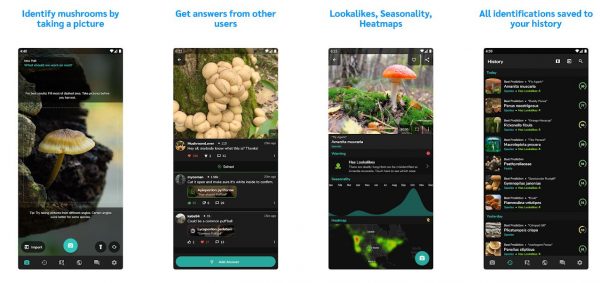
Price: Free; $4.99 for ShroomID Pro, $27.99 for ShroomID Premium
Mushroom foragers will also find ShroomID helpful. The app makes use of its very own machine learning technology that the developers claim can identify any mushroom with over 80 percent accuracy. Also, you can use it even when you’re offline. This is handy if you’re looking for mushrooms in the part of the woods that doesn’t have internet coverage. You simply need to take a photo of the mushroom before harvesting and the app will identify it for you within seconds. Instead of uploading past photos, you can snap images on the spot via the camera mode in-app.
Besides those features, ShroomID also allows you to compare the photo you’ve taken with verified images of mushroom species. The app has image geotagging, a seasonality chart, a heatmap, and a free database with research predictions. Plus, it gives you access to your identification history, which you can view on a map. You can also filter it by species and date.
19. NatureID
Price: Free; Premium starts at $1.99
NatureID is one of the most versatile plant identification apps featured here. Why, you ask? It can do more than just identifying more than 10,000 plant species, and doubling as a plant care advisor, doctor, journal, and encyclopedia. It can help you recognize your cat’s or dog’s breed.
The pet and plant identification app works like the other entries in this list because it only needs photos. The snapshots can be viewed together with those from the online user community. This makes the app also great for when you simply want to read about and marvel at nature during your free time.
20. PlantIn
Price: Free; Premium Access starts at $6.99
PlantIn has a feature many other plant identification apps don’t have. That is its smart light meter, which shows the lighting level in the place where your plant currently is. The AR-based feature works while the app scans the plant type.
Once the plant lighting level is analyzed, you can use the app to scan nearby places where you can transfer the plant. PlantIn will let you know whether the lighting at your prospect place is right or not for your plant.
The app also does what other plant identifiers can do. It reminds about your plant care routines and can check your plant’s diseases, which you can take note of for in-app botanist consultations.
Care for Plants Using the Best Plant Identification Apps
Plant identification apps are handy tools for a plant lover like you, whether you’re just starting to try your hand at gardening or you’ve been at it for quite some time. You can find hundreds of them on your official app stores, but only a handful can give you accurate results. A lot of the plant identification apps rely on AI, which is good. Some also have a team of experts working to help you identify your plants, which might be better. Still, it’s up to you which plant identification apps you’ll end up downloading.
Have you used plant identification apps before? If so, what was your experience with them? Comment to let us know!
